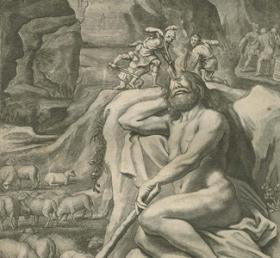“Was this the face that launch’d a thousand ships, / And burnt the topless towers of Ilium?”
All right, you caught me: that isn’t Homer. But in making the above, now-famous, reference to Homer’s Iliad in Doctor Faustus, published 1604, Christopher Marlowe was just continuing a trend. As I was vividly reminded throughout Monday’s faculty panel, “Translating Homer: From Papyri to Alexander Pope”, Homer’s Iliad and Odyssey have inspired thousands of references and translations through the ages, from the 18th-century rhyming efforts of Alexander Pope all the way to Hollywood. Nor is the medium of translation confined to writing—the Translating Homer exhibit displays beautifully illustrated editions of Homer along with a recording of the epic poetry in recitation, as it was once performed.
The topics covered by the members of the faculty panel (listed below) were many and varied. Yet I was particularly intrigued by two points, which dealt with the impact and context of translation.
The first was in Professor Sean Silver’s (English Literature) presentation on the Iliad in translation. Displaying a long list of translations, only the author’s name and date of publication given, he divided it in two; on the right were translations with scholarly or linguistic goals, but as for the left, I was puzzled as to their common factor – I could not see any connection between all of the publication dates or authors. Then, he revealed that each had been written in response to some sort of military or violent conflict. Whether the connection between translation and time was explicitly stated or not in the translations themselves, it was clear to the audience that these authors gave voice to their own experiences by translating the greatest war story ever told.
One example stuck in my mind: Stephen Mitchell’s 2011 translation omits more violent episodes of the Iliad (including entire books). In light of U.S. involvement in Afghanistan and Iraq, we considered, what does Mitchell’s translation signify? Are we loathe to recognize the more savage qualities of war, preferring to stay removed? These are the powerful questions the translator asks himself and his readers.
The second point was raised by Professor Ruth Scodel (Classical Studies). Translating Homer has become a business, she said, of sales to classrooms. Professor Scodel then discussed the power of English translations or textbooks to influence students, as these are the translations that may define the student’s opinion on Homer forever. She brought up classroom techniques—such as having students analyze different English translations, or the use of a less traditional Iliad translation—that are necessary to bring out the relevance of Homer to a modern audience.
This struck home for me. As a Classics student and an ardent lover of Homer’s poetry, I’ve listened to peers denounce (with surprising virulence) the Iliad and Odyssey for their complexity and archaic language, their lack of applicability, their page count. I’d go to great lengths to never again hear the complaint “this is boring and pointless” applied to Homer’s peerless works of war and glory, honor and loss, tragedy and triumph.
Indeed, every presentation made me think about the significance of translation in sharing Homer’s poetry, as well as the incredible odyssey the texts have taken to reach this point. I left the panel with a wealth of things to ponder—it was, overall, an intellectual feast, a true joy to this fan of Homer, and magnificent proof that, though composed in a “dead” language, the Iliad and Odyssey are living, breathing, and thriving today.
Ana Maria Guay
“Translating Homer: From Papyri to Alexander Pope” is the special collections exhibit in the Hatcher Library Audubon Room, running until Oct.7. Panelists on Sept. 24, 2012 included Pablo Alvarez (UM Library), Richard Janko (Classical Studies), Karla Mallette (Romance Languages and Near Eastern Studies), Yopie Prins (Comparative Literature), Ruth Scodel (Classical Studies), and Sean Silver (English Literature).




